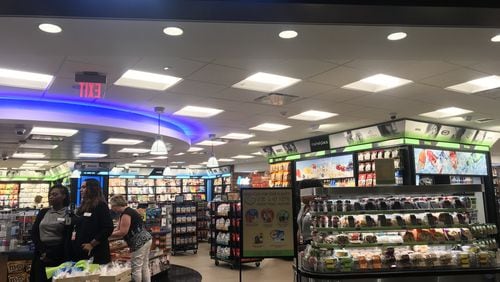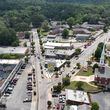Earlier this year, travelers looking to while away the time at Hartsfield-Jackson International Airport could have browsed for designer brands at Clutch, Luxury Boutique or Sunglass Icon at the center of Concourse F.
But go back today, and those three stores are no longer there.
In their place is a huge Hudson, the ubiquitous convenience store and bookseller found at airports across the nation.
The revamp is the latest indication of the struggles of growing luxury retail at the airport.
The new emporium on international Concourse F is the largest Hudson store in the world, selling candy, books, convenience items and tech accessories — travel basics that passengers may want for their trip.
It replaces shops that “under-patronized,” said Dwayne Heard, president of MasterConcessionAir, one of Hudson’s joint venture partners for the retail shops on Concourse F. “The travelers are telling us what they don’t want.”
Hartsfield-Jackson has long struggled to promote the idea of shopping at the airport.
Other international airports in Asia and the Middle East are well known for having, in essence, high-end malls. In Atlanta, the world's busiest airport also wants to boost revenue by becoming a shopping destination, but has come up against challenges.
“Nobody goes to the airport to buy a wallet or a watch or a ring or jewelry,” said concessions expert Alan Gluck, a senior manager for consulting firm ICF.
Last year, Hartsfield-Jackson asked entrepreneurs to come up with ideas to promote airport shopping. One proposed deploying personal shoppers around the airport to take orders via an app and deliver purchases to passengers at their gates.
A key factor that can push down luxury retail sales at the Atlanta airport is Delta Air Lines’ dominance of the hub. Since Delta has a large U.S. customer base, a large share of passengers waiting for flights on international concourses at Delta’s Atlanta hub are Americans starting their trips — people who are less likely to shop for large items they’d have to carry throughout their travels, according to Gluck.
Delta has long had far fewer foreign carriers than other hubs in New York, Miami, San Francisco, Los Angeles and Chicago.
An airport like New York’s John F. Kennedy International has many foreign carriers and travelers visiting the United States. It’s those travelers who tend to shop at the airport before they return home.
Clutch and Luxury Boutique were among the worst-performing shops on Hartsfield-Jackson’s international concourses. The stores were originally opened by concessionaire HMSHost with Heard and other partners, but came under Hudson’s control through concessions industry mergers and acquisitions. Clutch’s gross revenue for the year was $150,000, or an average of about $411 a day.
In comparison, an InMotion Entertainment electronics store with a smaller space on Concourse F had gross revenue of nearly $1.4 million. Heard said the joint venture partners that invested in the Concourse F luxury boutique shops came up with the idea to transform the locations, some of which were obscured by an escalator, into a massive travel convenience store. They pitched the concept to Hudson executives, then to Hartsfield-Jackson concessions director Chilly Ewing.
“We were selling luxury items,” but had a disadvantage to the competition across the hallway — a massive duty free store, Heard said. “We finally woke up and said, ‘What are we doing here?’”
Since opening in June, the 5,000-square-foot Hudson store has outperformed the previous boutique locations by more than 50 percent, according to Heard.
Hartsfield-Jackson interim general manager Balram Bheodari said the change-up enhances the airport’s retail program.
“Our job is to make sure we provide the best level of service,” Bheodari said.
One of the challenges in Atlanta is that, during off-peak times for overseas flights, Hartsfield-Jackson uses international gates for domestic flights — and domestic travelers don’t spend as much.
“A lot of what happens on this concourse is still not international,” Heard said.
What’s more, international flights are split between Concourse E and Concourse F, meaning there isn’t a central shopping plaza they all pass through. While Concourse F is newer and posher, opening in 2012 with 12 gates, it is by gate count less than half the size of older international Concourse E with about 28 gates.
The Hudson superstore isn’t the only revamp on Concourse F. Also recently replaced is a Tommy Hilfiger store. Now in its place is a Tumi luggage store and 5th & Sunset, another sunglasses shop.
Selling luggage or accessories works better than apparel, because travelers are unlikely to do a lot of clothes shopping at the airport, Heard said. An airport location also competes with local department stores, which consumers may prefer because returns are easier, he said.
Still, airports are likely to continue to pursue luxury shops for the money, but also for the bragging points.
In Atlanta, “the facade is beautiful,” he said. “But people will take a picture of the facade and move on.”
Concessions revenue per passenger boarding a flight at Hartsfield-Jackson in 2017
Concourse T: $9.49
Concourse A: $10.21
Concourse B: $8.53
Concourse C: $9.05
Concourse D: $9.44
Concourse E: $10.70
Concourse F: $14.55
Source: Hartsfield-Jackson. E and F are considered international concourses; revenue totals do not include duty free or currency exchange.







